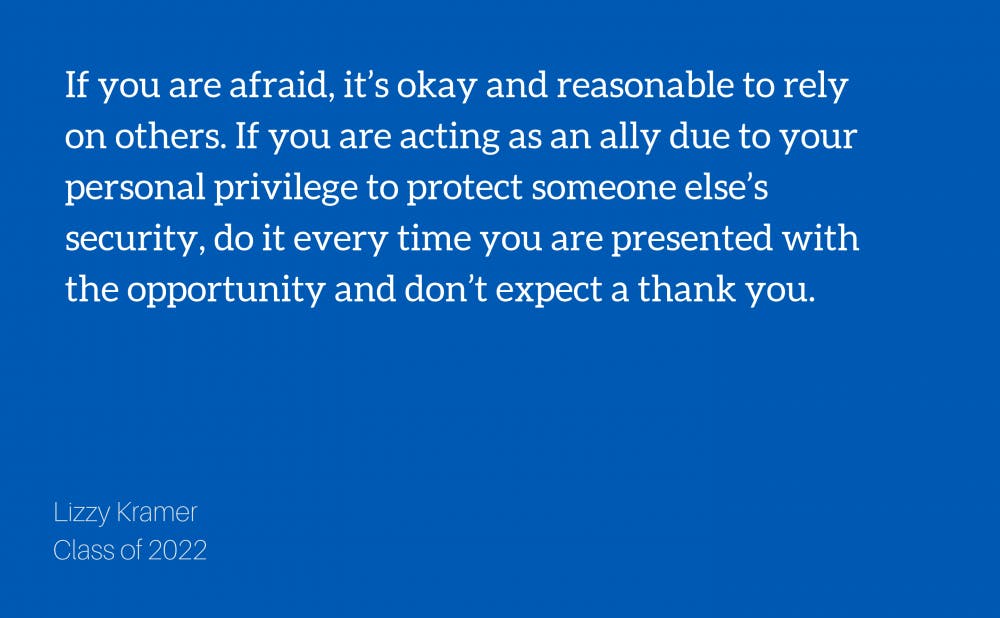Arriving at college last year, one of my greatest fears was sexual assault. Given that approximately a quarter of all female college students are sexually assaulted, and half of these assaults occur in the first six weeks of school, this is not an irrational phobia.
My mind still buzzing with the horror stories told by parents, friends and orientation week speakers, I came to Duke armed with hot pink mace and fierce words to throw at attackers. Even though I constructed a full theoretical plan of action, I still had no idea of what my actual reaction would be if something happened. My main defense weapon quickly became those surrounding me, specifically male friends. Perhaps it was an ingrained instinct from my childhood when I couldn’t go certain places without my brother, but whenever I felt unsafe I defaulted to relying upon the nearest male, entrusting them with my safety whether it was warranted or not.
However, this plan was far from foolproof, and in reality had the potential to place me in more vulnerable positions by creating a dynamic in which I was expected to be grateful when someone stepped in to offer security. Thus the beginning of college presented me with the challenge of balancing my individual responsibility to be safe with society’s role in protecting me. At Duke, I realized while it should be part of our culture’s responsibility to protect citizens, assault prevention strategies are ineffective as methods such as the blue light system offer a two minute response system even though assaults frequently occur in seconds. Colleges can easily confuse freshmen by insisting that their campuses are safe, leaving students unsure of the severity of the risks surrounding them.
By the nature of living in a country like America which normalizes masculine dominance, fear over sexual safety has become standard in the minds of many women. It seems one way to work towards shifting the risk of assault and harassment is to normalize protecting one another from further harm by enforcing policies of bystander intervention so that even when someone acts out of line, others are ready to dive in and help.
Unfortunately, bystander intervention is of course full of flaws - some people step in, some want to but are too scared, and some don’t realize they can. We are left filling in the cracks once again. While intervening can be anxiety inducing and overwhelming for some, it is something we all have to work on, regardless of gender, in order to make Duke’s campus and the world as a whole, a safer place. No matter your gender, you have a responsibility to protect not only your own safety, but also that of others.
What has this philosophy meant to me? I’ve come to realize that I owe it to myself to be aware of the risks in the world—to not pretend that Duke is perfect in protecting me from harm. It means that I check over my shoulder, I prepare for the worst, I sometimes rely upon others when I feel unsafe. Through taking ownership of my own safety, I have realized some of the misconceptions of victims of harassment. Primarily, that no individual ever owes their harasser a response, attention, or guilt. No matter the situation, unwanted attention never has to be returned or even acknowledged. I have also come to realize that individuals with a greater sense of personal safety always have an obligation to make sure their companions, and surroundings in general, are secure—ie. girls do not need to be depicted as damsels in distress, showering all their praise upon the man who walks them home. It is simply expected that a man who is aware of the implications of his gender on his safety will look out for those around him.
We all grew up watching movies where the idyllic scene of a scared girl being walked home by a strong man was common. Now, I realize how this idea normalizes a power dynamic of “weaker” individuals relying on those perceived as strong, who only do these “noble” feats to earn the gratitude of someone else. Going forward, it is important that preventing harassment and assault is not rewarded or romanticized as an indicator of personal moral strength, but rather normalized, in the same way that giving up your seat for an elderly person is expected.
In short, if you are afraid, it’s okay and reasonable to rely on others. If you are acting as an ally due to your personal privilege to protect someone else’s security, do it every time you are presented with the opportunity and don’t expect a thank you.
Lizzy Kramer is a Trinity sophomore. Her column runs on alternate Tuesdays.
Get The Chronicle straight to your inbox
Signup for our weekly newsletter. Cancel at any time.

